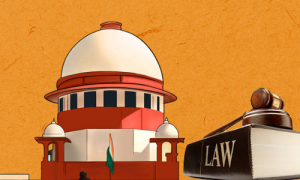Time Will Tell

A set pattern of attacks on the Supreme Court of India has emerged last week from two sources – one from a constitutional authority and another from a couple of ruling party MPs. First, it was Vice President Jagdeep Dhankhar who criticised the Supreme Court over a ruling that established a timeline for the President of India to sign bills passed by state legislatures. He was referencing the landmark April 8 verdict of the top court in the case of Tamil Nadu vs. the Governor, which was perceived as a victory for states throughout India. Calling for the judiciary to be held accountable, Dhankhar referred to Article 142 of the Constitution as a “nuclear missile against democratic forces” that is accessible to the judiciary at all times. Article 142 states that “The Supreme Court in the exercise of its jurisdiction may pass such decree or make such order as is necessary for doing complete justice in any cause or matter pending before it.” This indicates that the article grants the Supreme Court the discretion to issue any order or judgment it deems necessary to achieve full justice in any case it reviews. The VP went on to add that the Supreme Court was acting like a “super Parliament.”
Two days after these scathing remarks from the VP, two BJP MPs, Nishikant Dubey and Dinesh Sharma, also launched an attack on the Supreme Court. While Dinesh Sharma, a former deputy chief minister of Uttar Pradesh, stated that neither the Parliament nor the President can be directed by anyone, Nishikant Dubey, one of the more vocal members of the BJP in the Lok Sabha, launched a broadside against the top court, arguing that if the apex court is responsible for making laws, then the Parliament and the state assemblies should be shut down. He went to the extent of alleging that Chief Justice of India Sanjiv Khanna was responsible for “civil wars” in the country.
In an apparent damage control attempt, the BJP has distanced itself from the comments made by its MPs. However, it remains silent regarding equally unacceptable statements about the judiciary made by VP Dhankhar, one of its prominent appointees to a high constitutional position and who came to public notice while he was Governor of West Bengal. While in that position, as a devoted political party worker, he did not spare any opportunity to hinder the normal functioning of the state government of Chief Minister Mamata Banerjee.
Those attacking the Supreme Court over its perceived “overreach” perhaps fail to understand that for a healthy democracy to function, all its three pillars – the legislature, the executive and the judiciary – have to perform their duties in tandem and free of each other. Parliament makes laws and the government executes that law, but in the absence of checks and balances in the form of the judiciary – and in a much more limited manner, the press and civil society – elected governments generally tend to become autocratic. This has been the practice in all the thriving democracies the world over. Just a day before, the U.S. Supreme Court halted the Donald Trump administration’s move to deport Venezuelans from the U.S. under an old, unused wartime law. This shows that in a proper working democracy, even the world’s most powerful man, the POTUS, is not immune to the judiciary’s powers in the system of checks and balances.
History is replete with examples of what absolute power of people’s elected representatives, once they take the seat of power in the government, can do to a country and its people. Two of the classic examples are of Germany electing Adolf Hitler as chancellor only once and the resultant worldwide destruction, and the second is of modern-day Russia electing Vladimir Putin, who has started a war in Europe and has changed that country’s Constitution to enable him to remain as president for life. In the contemporary era, strongman leaders like Viktor Orban of Hungary and Benjamin Netanyahu of Israel have been reined in by their judiciary for their acts of omission and commission.
In India, the government has, on several occasions, pushed its limits of power, bypassing all other institutions. The demonetization of the Rs 1,000 and Rs 500 currency notes carried out by the government in November 2016 without the Parliament’s approval is a landmark example of the political excesses that negatively affected the growing economy of the country.
The critical comments directed at the Supreme Court over the past week suggest that the judiciary is being taught a lesson for its timely interventions. However, one must not forget that when Parliament is bypassed and the executive is weak and incapable of fulfilling its responsibilities, it is the judiciary’s duty to step in. The independence of the judiciary and all other institutions is sacrosanct for any democracy to flourish. However, the country needs to watch how truly strong the judiciary is in its beliefs and convictions in this instance. Too many times in the recent past the country has seen how judges, looking strong and resolute, later crumble and cower before powerful politicians. Only time will tell.
News